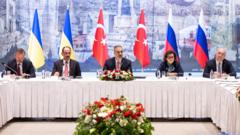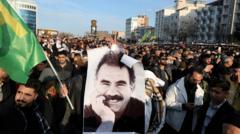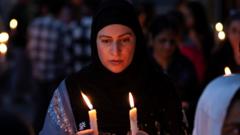As Bangladesh navigates political turmoil following the ousting of its authoritarian leader, Islamist hard-liners seize the opportunity to advocate for a fundamentalist agenda, threatening the nation's secular foundations.**
A Turning Tide: Islamist Extremism Resurfaces Amid Bangladesh's Political Uncertainty**

A Turning Tide: Islamist Extremism Resurfaces Amid Bangladesh's Political Uncertainty**
A surge of religious conservatism emerges in Bangladesh as political instability gives way to extremist ideologies.**
As political unrest shakes Bangladesh, extremist factions are capitalizing on the void left by the fall of the authoritarian regime. In a country of 175 million, these groups are increasingly vocal about enforcing rigid interpretations of Islam, specifically targeting women’s freedoms. Reports reveal that in towns across the nation, rules restricting women's participation in sports and public life have been enforced.
Demonstrations in the capital, Dhaka, express an alarming shift, with protesters demanding severe punishments for those seen as disrespecting Islam. The chants of extremists calling for the enforcement of an Islamic caliphate resonate in the streets.
Interviews with Islamist representatives suggest that these movements, some previously banned, are pushing for a governance model that fundamentally redefines Bangladesh’s identity. Under their influence, there is a growing likelihood that secularism will fade from the new constitution being drafted, likely replaced by pluralistic values more aligned with religious tenets.
This resurgence of Islamist ideology points to an unsettling trajectory for a nation striving for a democratic revival, but now facing increasing pressure to align with radical interpretations of its religious roots.

















